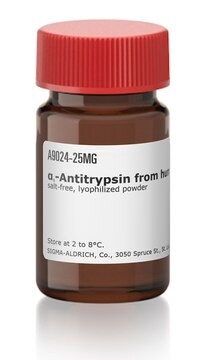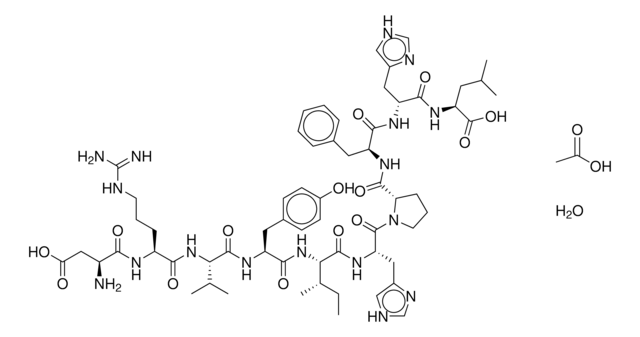C4163
α-Crystallin from bovine eye lens
lyophilized powder
Synonym(s):
alpha-Crystallin
Sign Into View Organizational & Contract Pricing
All Photos(1)
About This Item
Recommended Products
biological source
bovine eye (lens)
Assay
≥70% (biuret)
form
lyophilized powder
technique(s)
cell culture | mammalian: suitable
storage temp.
−20°C
Gene Information
bovine ... CRYAA(281718) , CRYAB(281719)
Application
α-Crystallin is a lens protein that contains two homologous subunits: αA- and αB-crystallins. α-Crystallin displays chaperone-like activity and plays an important role in maintaining lens transparency. It has been noted that in diabetic conditions of rats there is a decline in the chaperone activity of α-Crystallin. Research has shown that a dietary antioxidant, curcumin, can prevent this loss of chaperone activity.
Biochem/physiol Actions
α-Crystallin is a small heat-shock protein that has chaperone-like activity, preventing protein aggregation in vitro. Point mutations in α-crystallin genes are believed to be responsible for hereditary cataract development.
Storage Class Code
11 - Combustible Solids
WGK
WGK 3
Flash Point(F)
Not applicable
Flash Point(C)
Not applicable
Personal Protective Equipment
dust mask type N95 (US), Eyeshields, Gloves
Certificates of Analysis (COA)
Search for Certificates of Analysis (COA) by entering the products Lot/Batch Number. Lot and Batch Numbers can be found on a product’s label following the words ‘Lot’ or ‘Batch’.
Already Own This Product?
Find documentation for the products that you have recently purchased in the Document Library.
Laxman Mainali et al.
Current eye research, 46(2), 185-194 (2020-06-23)
Purpose/Aim: The amount of membrane-bound α-crystallin increases significantly with age and cataract formation, accompanied by a corresponding decline in the level of α-crystallin in the lens cytoplasm. The purpose of this research is to evaluate the binding affinity of α-crystallin
Raju Timsina et al.
Experimental eye research, 202, 108337-108337 (2020-11-01)
It is well-studied that the significant factor in cataract formation is the association of α-crystallin, a major eye lens protein, with the fiber cell plasma membrane of the eye lens. The fiber cell plasma membrane of the eye lens consists
Axel Leppert et al.
Protein science : a publication of the Protein Society, 31(8), e4378-e4378 (2022-07-29)
Molecular chaperones are essential to maintain proteostasis. While the functions of intracellular molecular chaperones that oversee protein synthesis, folding and aggregation, are established, those specialized to work in the extracellular environment are less understood. Extracellular proteins reside in a considerably
Raju Timsina et al.
Current eye research, 47(6), 843-853 (2022-02-19)
This research aims to probe the interaction of α-crystallin with a model of human, porcine, and mouse lens-lipid membranes. Cholesterol/model of human lens-lipid (Chol/MHLL), cholesterol/model of porcine lens-lipid (Chol/MPLL), and cholesterol/model of mouse lens-lipid (Chol/MMLL) membranes with 0-60 mol% Chol were
P Anil Kumar et al.
Molecular vision, 11, 561-568 (2005-08-10)
A decline in the chaperone-like activity of eye lens alpha-crystallin in diabetic conditions has been reported. In this study, we investigated whether curcumin, a dietary antioxidant, can manipulate the chaperone-like activity of alpha-crystallin in diabetic rat lens. A group of
Our team of scientists has experience in all areas of research including Life Science, Material Science, Chemical Synthesis, Chromatography, Analytical and many others.
Contact Technical Service








